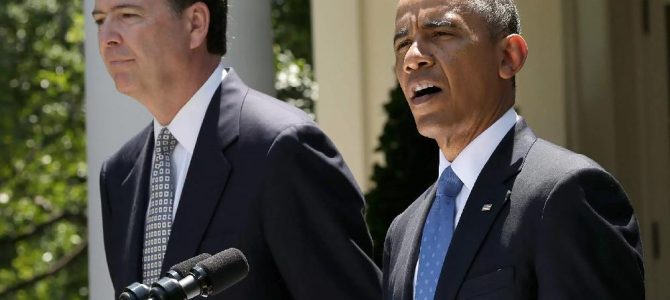Surrogates for Democratic presidential candidate Hillary Clinton’s campaign were quick to attack FBI Director James Comey after he reopened the criminal investigation against Clinton, but President Barack Obama and his team seem to be working off a completely different script.
White House Press Secretary Josh Earnest pointedly refused to criticize Comey during the daily White House press conference on Monday. Instead, Earnest conveyed the president’s belief that Comey is “a man of character and integrity.”
“Director Comey is a man of integrity, he’s a man of principle, and he’s a man of good character,” Earnest said. “The president doesn’t believe that Director Comey is intentionally trying to influence the outcome of an election.”
“The president doesn’t believe he’s secretly strategizing to benefit one candidate or one political party,” Earnest concluded. “He’s in a tough spot.”
Earnest repeats that Pres Obama believes Comey is a man of Integrity, character and principle and has a very difficult job.
— Mark Knoller (@markknoller) October 31, 2016
Earnest says Obama does not think Comey was intentionally trying to influence the outcome of the election. Calls him a "man of integrity."
— Ryan Struyk (@ryanstruyk) October 31, 2016
The rather muted official response from the White House took many by surprise given the speed with which Democrats who had previously praised Comey’s independence turned on him over the weekend. So what gives? Does Obama really personally believe that Comey is still a swell dude in light of the reopened criminal investigation of Hillary Clinton’s secret e-mail server?
I doubt it. If I had to guess, I’d say Obama’s feelings probably match those of Clinton’s supporters. The problem for Obama is that he can’t actually make those feelings public, at least not right now. And the reason for that is the issue of a special prosecutor being appointed to take control of the investigation. Neither the White House nor Clinton’s allies have any desire to appoint someone with carte blanche authority to dive into the Clinton case. For over a year, Republicans have called for the appointment of a special prosecutor — similar to the Bush administration’s appointment of Patrick Fitzgerald to investigate potentially criminal leaks of former CIA official Valerie Plame’s identity in 2003 — and for over a year, the Obama administration has steadfastly refused to accede to those demands (in a rather delicious bit of irony, it was Comey himself who appointed Fitzgerald due to then-Attorney General John Ashcroft’s recusal from the case).
Leadership at Obama’s Department of Justice (DOJ), however, is every bit as politically compromised as the Bush DOJ was in 2003. Loretta Lynch secretly met with former President Bill Clinton just days before it was announced that Clinton would not face any criminal charges, a meeting which called into question Lynch’s independence and commitment to the rule of law.
Then there is Comey’s top deputy, Andrew McCabe, who is also tainted. The Wall Street Journal reported last week that Terry McAuliffe, a longtime Clinton family friend and fundraiser, and his associates helped raise over $675,000 for the political campaign of McCabe’s wife.
So you have a compromised attorney general and compromised deputy FBI director at the top of the investigation. The only seemingly independent person with any real remaining authority over the case is James Comey. And that’s exactly why Obama can’t afford to throw him under the bus. In order to stave off calls for a special prosecutor to take over the case, Obama has to make clear that he has every confidence in Comey to conduct a fair and impartial investigation. If Obama suddenly started working off the Clinton script and demanding Comey’s head, Obama could no longer credibly say a special prosecutor was not necessary. Without Comey at the top, a special prosecutor becomes inevitable given the blatant conflicts of interest swirling around Lynch and McCabe.
Whether Obama wants to avoid that because he wants to protect Clinton, or he wants to protect himself given that he and Clinton exchanged classified e-mails that were sent through her server, or he just wants to make sure his acolytes have complete control of the situation, what’s clear is that he has zero political incentive to make the case, even indirectly, for a special prosecutor. As a result, he’s going to avoid criticizing Comey for as long as possible. And that’s the real reason his administration refused to torch Comey on Monday.









